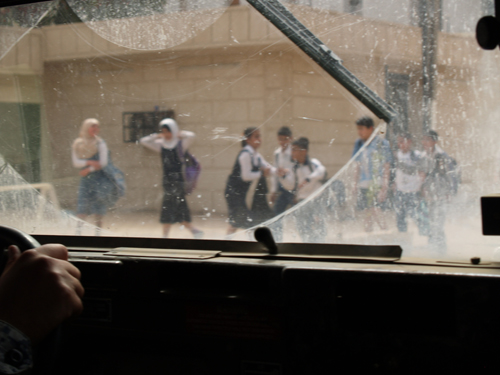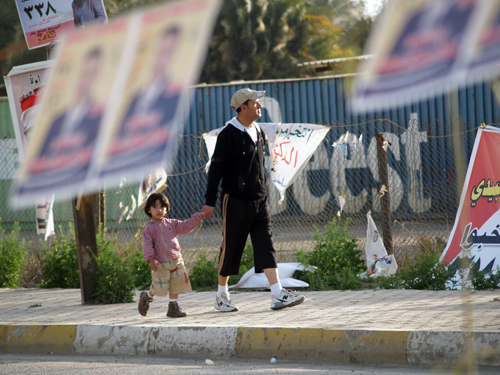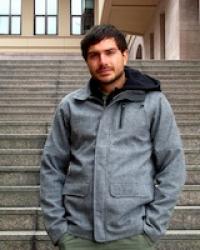
A view of a Baghdad street through a dirt-caked windshield. (Dimiter Kenarov)
After the post-election glow, Baghdad is back in the real world. The streets are clogged with vehicles honking and people hawking. Men are walking to work (or, more likely, looking for jobs); women are out shopping (if their husbands are lucky enough to have jobs). The posters of politicians sag, peel off the blast walls, and fall face down, trampled under the shoes of millions.
Nobody is talking about it, but the elections were garbage. Lots and lots of garbage. The political messages are garbage. Democracy is garbage.
Let me explain. There were more than 300 parties competing for the 325 seats in the Council of Representatives. Each party had thousands of posters displayed all over Baghdad. Highways, trees, blast walls, fences, buildings, cars, bicycles. That’s a lot of posters.
Now that the elections are over, the posters are not even worth the paper they are printed on. Torn and muddy, they cover the pavement. Those serious, menacing faces, promising to clean up the country, have become part of the problem.
To talk about environmental pollution in Iraq may seem frivolous to some, a bit like worrying about the cholesterol levels of a suicide bomber. This place needs security first of all, adults need jobs, kids need a chance at a decent education. No need to worry about garbage just yet.

A father and daughter amid the flurry of obsolete posters. (Dimiter Kenarov)
I worry. Iraq is an environmental disaster. Iraq is a wasteland, a landfill the size of a country. Mounds of trash, like surreal sand dunes, pile up around residential buildings in Baghdad. Plastic bottles scattered everywhere, plastic bags flying from the barbwire like prayer flags. Burning tires. Feral dogs dig in the refuse; sheep and cows graze over industrial leftovers. And toddlers play among the sheep and the cows.
There is no reliable garbage collection system in Baghdad. The more affluent neighborhoods try to keep their streets clean, but all efforts prove pointless in the end: can the wind blow in one part of the city, but not in another? When it rains, the antiquated sewage system backs up, and human waste rises up to the surface, a thick layer of mud that is not mud. Sloshing through shit is more than a metaphor for the situation around here.
But, perhaps, what seems most striking for a chance visitor like me is the way the residents of Baghdad have managed to preserve their dignity in the middle of this dump. They endure—and always with clean shirts, with clean dishdashas, with clean hijabs, with clean shoes. There is nothing to clean up around here but the faces of politicians.
Dimiter Kenarov is in Baghdad with a grant from the Pulitzer Center on Crisis Reporting. Learn more about this project on the Pulitzer website.







